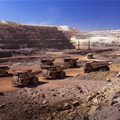The recent financial reports of global mining giants Anglo American and Glencore painted a picture of an industry grappling with challenging market conditions. Both companies saw significant declines in profitability, highlighting the complexities of navigating volatile commodity prices and economic downturns.

Storm clouds circle the PGMs market. Source: DALL-E 3
"Anglo-American's staggering 94% year-on-year decline in annual profit underscores the inherent volatility in commodity markets," commented Roger Eskinazi, managing director of Tickmill South Africa.
"Such drastic fluctuations are not uncommon in an industry heavily influenced by market forces."
Glencore, on the other hand, saw its EBITDA halved compared to 2022.
"This reflects a year marked by subdued economic activity, decreased manufacturing demand, and persistently low commodity prices, particularly in coal, natural gas, and oil," Eskinazi explained.
Falling prices and rising costs
The culprit behind the profit slumps? Eskinazi points to the double whammy of falling commodity prices and escalating input costs.
"This combination puts significant pressure on profitability margins, making it harder for companies like Anglo-American to maintain steady financial performance," he says.
Glencore's woes were further compounded by declining prices for cobalt and zinc.
China's slowdown adds to the gloom
The economic slowdown in China, a key market for both companies, played a significant role in the challenges they faced.
"The slowdown over the last 18 months has been a notable factor contributing to these difficulties," Eskinazi said.
In response to these difficulties, Glencore and Anglo-American took contrasting approaches. Glencore implemented a drastic 60% reduction in dividends, prioritizing financial prudence as it moves forward with a significant acquisition.
"This move underscores the company's commitment to managing its finances prudently, particularly as it moves forward with a USD 6.9 billion acquisition of Elk Valley Resources," Eskinazi said.
The acquisition expands Glencore's steel-making coal capacity by 20 million tons, strategically positioning them for future growth.
Walking a tightrope
Anglo, on the other hand, opted for job cuts and a review of contractor agreements at its South African operations.
Such measures are often necessary in times of economic uncertainty to streamline operations and improve efficiency
Despite these efforts, both companies face concerns regarding their debt levels. Glencore's net debt has risen to $4.9bn, approaching the lower maximum threshold.
"This suggests ongoing challenges in balancing the company's financial obligations with its strategic investments and operational performance," Eskinazi said.
Anglo's net debt also soared by 50% to $10.6bn, highlighting their financial strain.
"Such a sharp rise in debt levels could potentially limit the company's flexibility and increase its vulnerability to market fluctuations.”
Navigating uncertainty
While Glencore's preliminary numbers reflect a tough operating environment and the need for significant adjustments, their strategic moves demonstrate a commitment to navigating these challenges and positioning themselves for future growth and stability.
"The acquisition demonstrates their commitment to navigating these challenges and positioning themselves for future growth," Eskinazi said.
The outlook for Anglo-American is similar.
"The indication of further rationalisation efforts across the company reflects Anglo American's determination to navigate through the current economic headwinds."
With commodity prices expected to remain under pressure amidst reduced demand and a sluggish global economy, prudent cost management will be crucial for both companies' survival and future growth.































